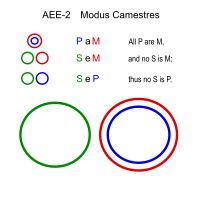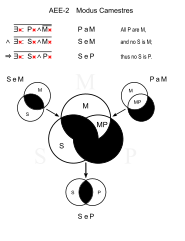Syllogism
This article has multiple issues. Please help improve it or discuss these issues on the talk page. (Learn how and when to remove these template messages)
|
A syllogism (Greek: συλλογισμός, syllogismos, 'conclusion, inference') is a kind of logical argument that applies deductive reasoning to arrive at a conclusion based on two propositions that are asserted or assumed to be true.

In its earliest form (defined by Aristotle in his 350 BC book Prior Analytics), a deductive syllogism arises when two true premises (propositions or statements) validly imply a conclusion, or the main point that the argument aims to get across.[1] For example, knowing that all men are mortal (major premise) and that Socrates is a man (minor premise), we may validly conclude that Socrates is mortal. Syllogistic arguments are usually represented in a three-line form:
All men are mortal.
Socrates is a man.
Therefore, Socrates is mortal.[2]
In antiquity, two rival syllogistic theories existed: Aristotelian syllogism and Stoic syllogism.[3] From the Middle Ages onwards, categorical syllogism and syllogism were usually used interchangeably. This article is concerned only with this historical use. The syllogism was at the core of historical deductive reasoning, whereby facts are determined by combining existing statements, in contrast to inductive reasoning in which facts are determined by repeated observations.
Within some academic contexts, syllogism has been superseded by first-order predicate logic following the work of Gottlob Frege, in particular his Begriffsschrift (Concept Script; 1879). Syllogism, being a method of valid logical reasoning, will always be useful in most circumstances and for general-audience introductions to logic and clear-thinking.[4][5]
Early history
In antiquity, two rival syllogistic theories existed: Aristotelian syllogism and Stoic syllogism.[3]
Aristotle
Aristotle defines the syllogism as "a discourse in which certain (specific) things having been supposed, something different from the things supposed results of necessity because these things are so."[6] Despite this very general definition, in Prior Analytics Aristotle limits himself to categorical syllogisms that consist of three categorical propositions, including categorical modal syllogisms.[7]
The use of syllogisms as a tool for understanding can be dated back to the logical reasoning discussions of
Prior Analytics, upon rediscovery, was instantly regarded by logicians as "a closed and complete body of doctrine", leaving very little for thinkers of the day to debate and reorganize. Aristotle's theory on the syllogism for
Aristotle's Prior Analytics did not, however, incorporate such a comprehensive theory on the modal syllogism—a syllogism that has at least one modalized premise, that is, a premise containing the modal words necessarily, possibly, or contingently. Aristotle's terminology in this aspect of his theory was deemed vague and in many cases unclear, even contradicting some of his statements from On Interpretation. His original assertions on this specific component of the theory were left up to a considerable amount of conversation, resulting in a wide array of solutions put forth by commentators of the day. The system for modal syllogisms laid forth by Aristotle would ultimately be deemed unfit for practical use and would be replaced by new distinctions and new theories altogether.
Medieval syllogism
Boethius
Boethius (c. 475–526) contributed an effort to make the ancient Aristotelian logic more accessible. While his Latin translation of Prior Analytics went primarily unused before the 12th century, his textbooks on the categorical syllogism were central to expanding the syllogistic discussion. Rather than in any additions that he personally made to the field, Boethius' logical legacy lies in his effective transmission of prior theories to later logicians, as well as his clear and primarily accurate presentations of Aristotle's contributions.
Peter Abelard
Another of medieval logic's first contributors from the Latin West,
Jean Buridan
The French philosopher Jean Buridan (c. 1300 – 1361), whom some consider the foremost logician of the later Middle Ages, contributed two significant works: Treatise on Consequence and Summulae de Dialectica, in which he discussed the concept of the syllogism, its components and distinctions, and ways to use the tool to expand its logical capability. For 200 years after Buridan's discussions, little was said about syllogistic logic. Historians of logic have assessed that the primary changes in the post-Middle Age era were changes in respect to the public's awareness of original sources, a lessening of appreciation for the logic's sophistication and complexity, and an increase in logical ignorance—so that logicians of the early 20th century came to view the whole system as ridiculous.[8]
Modern history
The Aristotelian syllogism dominated Western philosophical thought for many centuries. Syllogism itself is about drawing valid conclusions from assumptions (axioms), rather than about verifying the assumptions. However, people over time focused on the logic aspect, forgetting the importance of verifying the assumptions.
In the 17th century, Francis Bacon emphasized that experimental verification of axioms must be carried out rigorously, and cannot take syllogism itself as the best way to draw conclusions in nature.[9] Bacon proposed a more inductive approach to the observation of nature, which involves experimentation and leads to discovering and building on axioms to create a more general conclusion.[9] Yet, a full method of drawing conclusions in nature is not the scope of logic or syllogism, and the inductive method was covered in Aristotle's subsequent treatise, the Posterior Analytics.
In the 19th century, modifications to syllogism were incorporated to deal with
A noteworthy exception is the logic developed in Bernard Bolzano's work Wissenschaftslehre (Theory of Science, 1837), the principles of which were applied as a direct critique of Kant, in the posthumously published work New Anti-Kant (1850). The work of Bolzano had been largely overlooked until the late 20th century, among other reasons, because of the intellectual environment at the time in Bohemia, which was then part of the Austrian Empire. In the last 20 years, Bolzano's work has resurfaced and become subject of both translation and contemporary study.
This led to the rapid development of
One notable exception to this modern relegation is the continued application of Aristotelian logic by officials of the
Boole's acceptance of Aristotle
- providing it with mathematical foundations involving equations;
- extending the class of problems it could treat, as solving equations was added to assessing validity; and
- expanding the range of applications it could handle, such as expanding propositions of only two terms to those having arbitrarily many.
More specifically, Boole agreed with what Aristotle said; Boole's 'disagreements', if they might be called that, concern what Aristotle did not say. First, in the realm of foundations, Boole reduced Aristotle's four propositional forms to one form, the form of equations, which by itself was a revolutionary idea. Second, in the realm of logic's problems, Boole's addition of equation solving to logic—another revolutionary idea—involved Boole's doctrine that Aristotle's rules of inference (the "perfect syllogisms") must be supplemented by rules for equation solving. Third, in the realm of applications, Boole's system could handle multi-term propositions and arguments, whereas Aristotle could handle only two-termed subject-predicate propositions and arguments. For example, Aristotle's system could not deduce: "No quadrangle that is a square is a rectangle that is a rhombus" from "No square that is a quadrangle is a rhombus that is a rectangle" or from "No rhombus that is a rectangle is a square that is a quadrangle."
Basic structure
A categorical syllogism consists of three parts:
- Major premise
- Minor premise
- Conclusion/Consequent
Each part is a categorical proposition, and each categorical proposition contains two categorical terms.[13] In Aristotle, each of the premises is in the form "All S are P," "Some S are P", "No S are P" or "Some S are not P", where "S" is the subject-term and "P" is the predicate-term:
- "All S are P," and "No S are P" are termed universal propositions;
- "Some S are P" and "Some S are not P" are termed particular propositions.
More modern logicians allow some variation. Each of the premises has one term in common with the conclusion: in a major premise, this is the major term (i.e., the predicate of the conclusion); in a minor premise, this is the minor term (i.e., the subject of the conclusion). For example:
- Major premise: All humans are mortal.
- Minor premise: All Greeks are humans.
- Conclusion/Consequent: All Greeks are mortal.
Each of the three distinct terms represents a category. From the example above, humans, mortal, and Greeks: mortal is the major term, and Greeks the minor term. The premises also have one term in common with each other, which is known as the middle term; in this example, humans. Both of the premises are universal, as is the conclusion.
- Major premise: All mortals die.
- Minor premise: All men are mortals.
- Conclusion/Consequent: All men die.
Here, the major term is die, the minor term is men, and the middle term is mortals. Again, both premises are universal, hence so is the conclusion.
Polysyllogism
A polysyllogism, or a sorites, is a form of argument in which a series of incomplete syllogisms is so arranged that the predicate of each premise forms the subject of the next until the subject of the first is joined with the predicate of the last in the conclusion. For example, one might argue that all lions are big cats, all big cats are predators, and all predators are carnivores. To conclude that therefore all lions are carnivores is to construct a sorites argument.
Types
This section possibly contains original research. (July 2020) |
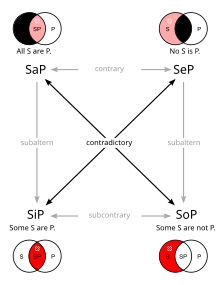
(Black areas are empty,
red areas are nonempty.)
There are infinitely many possible syllogisms, but only 256 logically distinct types and only 24 valid types (enumerated below). A syllogism takes the form (note: M – Middle, S – subject, P – predicate.):
- Major premise: All M are P.
- Minor premise: All S are M.
- Conclusion/Consequent: All S are P.
The premises and conclusion of a syllogism can be any of four types, which are labeled by letters[14] as follows. The meaning of the letters is given by the table:
| code | quantifier | subject | copula | predicate | type | example |
|---|---|---|---|---|---|---|
| A | All | S | are | P | universal affirmative | All humans are mortal. |
| E | No | S | are | P | universal negative | No humans are perfect. |
| I | Some | S | are | P | particular affirmative | Some humans are healthy. |
| O | Some | S | are not | P | particular negative | Some humans are not old. |
In Prior Analytics, Aristotle uses mostly the letters A, B, and C (Greek letters alpha, beta, and gamma) as term place holders, rather than giving concrete examples. It is traditional to use is rather than are as the copula, hence All A is B rather than All As are Bs. It is traditional and convenient practice to use a, e, i, o as infix operators so the categorical statements can be written succinctly. The following table shows the longer form, the succinct shorthand, and equivalent expressions in predicate logic:
| Form | Shorthand | Predicate logic |
|---|---|---|
| All A is B | AaB | or |
| No A is B | AeB | or |
| Some A is B | AiB | |
| Some A is not B | AoB |
The convention here is that the letter S is the subject of the conclusion, P is the predicate of the conclusion, and M is the middle term. The major premise links M with P and the minor premise links M with S. However, the middle term can be either the subject or the predicate of each premise where it appears. The differing positions of the major, minor, and middle terms gives rise to another classification of syllogisms known as the figure. Given that in each case the conclusion is S-P, the four figures are:
| Figure 1 | Figure 2 | Figure 3 | Figure 4 | |
|---|---|---|---|---|
| Major premise | M–P | P–M | M–P | P–M |
| Minor premise | S–M | S–M | M–S | M–S |
(Note, however, that, following Aristotle's treatment of the figures, some logicians—e.g., Peter Abelard and Jean Buridan—reject the fourth figure as a figure distinct from the first.)
Putting it all together, there are 256 possible types of syllogisms (or 512 if the order of the major and minor premises is changed, though this makes no difference logically). Each premise and the conclusion can be of type A, E, I or O, and the syllogism can be any of the four figures. A syllogism can be described briefly by giving the letters for the premises and conclusion followed by the number for the figure. For example, the syllogism BARBARA below is AAA-1, or "A-A-A in the first figure".
The vast majority of the 256 possible forms of syllogism are invalid (the conclusion does not follow logically from the premises). The table below shows the valid forms. Even some of these are sometimes considered to commit the existential fallacy, meaning they are invalid if they mention an empty category. These controversial patterns are marked in italics. All but four of the patterns in italics (felapton, darapti, fesapo and bamalip) are weakened moods, i.e. it is possible to draw a stronger conclusion from the premises.
| Figure 1 | Figure 2 | Figure 3 | Figure 4 |
|---|---|---|---|
| Barbara | Cesare | Datisi | Calemes |
| Celarent | Camestres | Disamis | Dimatis |
| Darii | Festino | Ferison | Fresison |
| Ferio | Baroco | Bocardo | Calemos |
| Barbari | Cesaro | Felapton | Fesapo |
| Celaront | Camestros | Darapti | Bamalip |

Fig. 1, treble clef. "A syllogism's letters can be best represented in music— take E, for example." -Marilyn Damord[citation needed]
The letters A, E, I, and O have been used since the medieval Schools to form mnemonic names for the forms as follows: 'Barbara' stands for AAA, 'Celarent' for EAE, etc.
Next to each premise and conclusion is a shorthand description of the sentence. So in AAI-3, the premise "All squares are rectangles" becomes "MaP"; the symbols mean that the first term ("square") is the middle term, the second term ("rectangle") is the predicate of the conclusion, and the relationship between the two terms is labeled "a" (All M are P).
The following table shows all syllogisms that are essentially different. The similar syllogisms share the same premises, just written in a different way. For example "Some pets are kittens" (SiM in Darii) could also be written as "Some kittens are pets" (MiS in Datisi).
In the Venn diagrams, the black areas indicate no elements, and the red areas indicate at least one element. In the predicate logic expressions, a horizontal bar over an expression means to negate ("logical not") the result of that expression.
It is also possible to use graphs (consisting of vertices and edges) to evaluate syllogisms.[15]
Examples

|
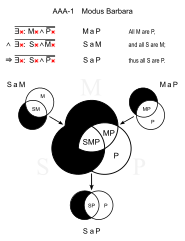
|
| M: men S: Greeks P: mortal |
Barbara (AAA-1)
- All men are mortal. (MaP)
- All Greeks are men. (SaM)
- ∴ All Greeks are mortal. (SaP)

|
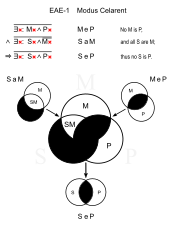
|
| M: reptile S: snake P: fur |
Celarent (EAE-1)
Similar: Cesare (EAE-2)
- No reptile has fur. (MeP)
- All snakes are reptiles. (SaM)
- ∴ No snake has fur. (SeP)
| Camestres (AEE-2) | |||
|---|---|---|---|
Camestres is essentially like Celarent with S and P exchanged.
|

|

|
| M: rabbit S: pet P: fur |
Darii (AII-1)
Similar: Datisi (AII-3)
- All rabbits have fur. (MaP)
- Some pets are rabbits. (SiM)
- ∴ Some pets have fur. (SiP)
| Disamis (IAI-3) | |||
|---|---|---|---|
Disamis is essentially like Darii with S and P exchanged.
|
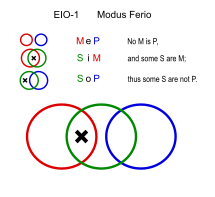
|

|
| M: homework S: reading P: fun |
Ferio (EIO-1)
Similar: Festino (EIO-2), Ferison (EIO-3), Fresison (EIO-4)
- No homework is fun. (MeP)
- Some reading is homework. (SiM)
- ∴ Some reading is not fun. (SoP)

|
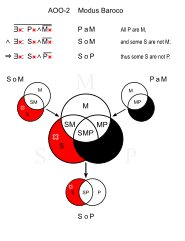
|
| M: mammal S: pet P: cat |
Baroco (AOO-2)
- All cats are mammals. (PaM)
- Some pets are not mammals. (SoM)
- ∴ Some pets are not cats. (SoP)

|
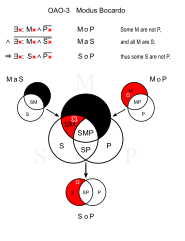
|
| M: cat S: mammal P: pet |
Bocardo (OAO-3)
- Some cats are not pets. (MoP)
- All cats are mammals. (MaS)
- ∴ Some mammals are not pets. (SoP)
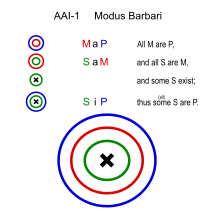
|
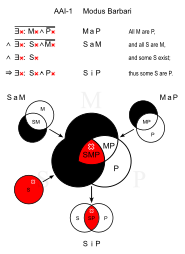
|
| M: man S: Greek P: mortal |
Barbari (AAI-1)
- All men are mortal. (MaP)
- All Greeks are men. (SaM)
- ∴ Some Greeks are mortal. (SiP)
| Bamalip (AAI-4) | |||
|---|---|---|---|
Bamalip is exactly like Barbari with S and P exchanged:
|

|
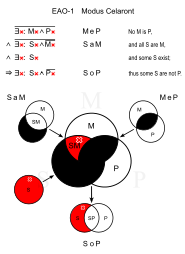
|
| M: reptile S: snake P: fur |
Celaront (EAO-1)
Similar: Cesaro (EAO-2)
- No reptiles have fur. (MeP)
- All snakes are reptiles. (SaM)
- ∴ Some snakes have no fur. (SoP)

|

|
| M: hooves S: human P: horse |
Camestros (AEO-2)
Similar: Calemos (AEO-4)
- All horses have hooves. (PaM)
- No humans have hooves. (SeM)
- ∴ Some humans are not horses. (SoP)
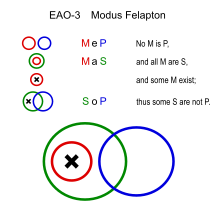
|

|
| M: flower S: plant P: animal |
Felapton (EAO-3)
Similar: Fesapo (EAO-4)
- No flowers are animals. (MeP)
- All flowers are plants. (MaS)
- ∴ Some plants are not animals. (SoP)

|

|
| M: square S: rhomb P: rectangle |
Darapti (AAI-3)
- All squares are rectangles. (MaP)
- All squares are rhombuses. (MaS)
- ∴ Some rhombuses are rectangles. (SiP)
Table of all syllogisms
This table shows all 24 valid syllogisms, represented by Venn diagrams. Columns indicate similarity, and are grouped by combinations of premises. Borders correspond to conclusions. Those with an existential assumption are dashed.
Terms in syllogism
This section has multiple issues. Please help improve it or discuss these issues on the talk page. (Learn how and when to remove these template messages)
|
With Aristotle, we may distinguish singular terms, such as Socrates, and general terms, such as Greeks. Aristotle further distinguished types (a) and (b):
- terms that could be the subject of predication; and
- terms that could be predicated of others by the use of the copula ("is a").
Such a predication is known as a
It is clear that nothing would prevent a singular term occurring in a syllogism—so long as it was always in the subject position—however, such a syllogism, even if valid, is not a categorical syllogism. An example is Socrates is a man, all men are mortal, therefore Socrates is mortal. Intuitively this is as valid as All Greeks are men, all men are mortal therefore all Greeks are mortals. To argue that its validity can be explained by the theory of syllogism would require that we show that Socrates is a man is the equivalent of a categorical proposition. It can be argued Socrates is a man is equivalent to All that are identical to Socrates are men, so our non-categorical syllogism can be justified by use of the equivalence above and then citing BARBARA.
Existential import
This section has multiple issues. Please help improve it or discuss these issues on the talk page. (Learn how and when to remove these template messages)
|
If a statement includes a term such that the statement is false if the term has no instances, then the statement is said to have existential import with respect to that term. It is ambiguous whether or not a universal statement of the form All A is B is to be considered as true, false, or even meaningless if there are no As. If it is considered as false in such cases, then the statement All A is B has existential import with respect to A.
It is claimed Aristotle's logic system does not cover cases where there are no instances. Aristotle's goal was to develop a logic for science. He relegates fictions, such as mermaids and unicorns, to the realms of poetry and literature. In his mind, they exist outside the ambit of science, which is why he leaves no room for such non-existent entities in his logic. This is a thoughtful choice, not an inadvertent omission. Technically, Aristotelian science is a search for definitions, where a definition is "a phrase signifying a thing's essence." Because non-existent entities cannot be anything, they do not, in Aristotle's mind, possess an essence. This is why he leaves no place for fictional entities like goat-stags (or unicorns).[16]
However, many logic systems developed since do consider the case where there may be no instances. Medieval logicians were aware of the problem of existential import and maintained that negative propositions do not carry existential import, and that positive propositions with subjects that do not supposit are false.
The following problems arise:
- In natural language and normal use, which statements of the forms, All A is B, No A is B, Some A is B, and Some A is not B, have existential import and with respect to which terms?
- In the four forms of categorical statements used in syllogism, which statements of the form AaB, AeB, AiB and AoB have existential import and with respect to which terms?
- What existential imports must the forms AaB, AeB, AiB and AoB have for the square of opposition to be valid?
- What existential imports must the forms AaB, AeB, AiB and AoB have to preserve the validity of the traditionally valid forms of syllogisms?
- Are the existential imports required to satisfy (d) above such that the normal uses in natural languages of the forms All A is B, No A is B, Some A is B and Some A is not B are intuitively and fairly reflected by the categorical statements of forms AaB, AeB, AiB and AoB?
For example, if it is accepted that AiB is false if there are no As and AaB entails AiB, then AiB has existential import with respect to A, and so does AaB. Further, if it is accepted that AiB entails BiA, then AiB and AaB have existential import with respect to B as well. Similarly, if AoB is false if there are no As, and AeB entails AoB, and AeB entails BeA (which in turn entails BoA) then both AeB and AoB have existential import with respect to both A and B. It follows immediately that all universal categorical statements have existential import with respect to both terms. If AaB and AeB is a fair representation of the use of statements in normal natural language of All A is B and No A is B respectively, then the following example consequences arise:
- "All flying horses are mythical" is false if there are no flying horses.
- If "No men are fire-eating rabbits" is true, then "There are fire-eating rabbits" is true; and so on.
If it is ruled that no universal statement has existential import then the square of opposition fails in several respects (e.g. AaB does not entail AiB) and a number of syllogisms are no longer valid (e.g. BaC, AaB->AiC).
These problems and paradoxes arise in both natural language statements and statements in syllogism form because of ambiguity, in particular ambiguity with respect to All. If "Fred claims all his books were Pulitzer Prize winners", is Fred claiming that he wrote any books? If not, then is what he claims true? Suppose Jane says none of her friends are poor; is that true if she has no friends?
The first-order predicate calculus avoids such ambiguity by using formulae that carry no existential import with respect to universal statements. Existential claims must be explicitly stated. Thus, natural language statements—of the forms All A is B, No A is B, Some A is B, and Some A is not B—can be represented in first order predicate calculus in which any existential import with respect to terms A and/or B is either explicit or not made at all. Consequently, the four forms AaB, AeB, AiB, and AoB can be represented in first order predicate in every combination of existential import—so it can establish which construal, if any, preserves the square of opposition and the validity of the traditionally valid syllogism. Strawson claims such a construal is possible, but the results are such that, in his view, the answer to question (e) above is no.
Syllogistic fallacies
People often make mistakes when reasoning syllogistically.[17]
For instance, from the premises some A are B, some B are C, people tend to come to a definitive conclusion that therefore some A are C.[18][19] However, this does not follow according to the rules of classical logic. For instance, while some cats (A) are black things (B), and some black things (B) are televisions (C), it does not follow from the parameters that some cats (A) are televisions (C). This is because in the structure of the syllogism invoked (i.e. III-1) the middle term is not distributed in either the major premise or in the minor premise, a pattern called the "fallacy of the undistributed middle". Because of this, it can be hard to follow formal logic, and a closer eye is needed in order to ensure that an argument is, in fact, valid.[20]
Determining the validity of a syllogism involves determining the
In simple syllogistic patterns, the fallacies of invalid patterns are:
- Undistributed middle: Neither of the premises accounts for all members of the middle term, which consequently fails to link the major and minor term.
- Illicit treatment of the major term: The conclusion implicates all members of the major term (P – meaning the proposition is negative); however, the major premise does not account for them all (i.e., P is either an affirmative predicate or a particular subject there).
- Illicit treatment of the minor term: Same as above, but for the minor term (S – meaning the proposition is universal) and minor premise (where S is either a particular subject or an affirmative predicate).
- Exclusive premises: Both premises are negative, meaning no link is established between the major and minor terms.
- Affirmative conclusion from a negative premise: If either premise is negative, the conclusion must also be.
- Negative conclusion from affirmative premises: If both premises are affirmative, the conclusion must also be.
Other types
- Disjunctive syllogism
- Hypothetical syllogism
- Legal syllogism
- Polysyllogism
- Prosleptic syllogism
- Quasi-syllogism
- Statistical syllogism
See also
- Syllogistic fallacy
- Argumentation theory
- Buddhist logic
- Enthymeme
- Formal fallacy
- Logical fallacy
- The False Subtlety of the Four Syllogistic Figures
- Tautology (logic)
- Venn diagram
References
- ^ Lundberg, Christian (2018). The Essential Guide to Rhetoric. Bedford/St.Martin's. p. 38.
- ^ John Stuart Mill, A System of Logic, Ratiocinative and Inductive, Being a Connected View of the Principles of Evidence, and the Methods of Scientific Investigation, 3rd ed., vol. 1, chap. 2 (London: John W. Parker, 1851), 190.
- ^ a b Frede, Michael. 1975. "Stoic vs. Peripatetic Syllogistic." Archive for the History of Philosophy 56:99–124.
- ISBN 9780840034175
- ISBN 9781118053072.
- ^ Aristotle, Prior Analytics, 24b18–20
- ^ Bobzien, Susanne. [2006] 2020. "Ancient Logic." Stanford Encyclopedia of Philosophy. § Aristotle.
- ^ Lagerlund, Henrik (2 February 2004). "Medieval Theories of the Syllogism". The Stanford Encyclopedia of Philosophy. Edward N. Zalta. Retrieved 17 February 2014.
- ^ a b Bacon, Francis. [1620] 2001. The Great Instauration. – via Constitution Society. Archived from the original on 13 April 2019.
- ^ Boole, George. [1854] 2003. The Laws of Thought, with an introduction by J. Corcoran. Buffalo: Prometheus Books.
- ^ van Evra, James. 2004. "'The Laws of Thought' by George Boole" (review). Philosophy in Review 24:167–69.
- ^ a b Corcoran, John. 2003. "Aristotle's 'Prior Analytics' and Boole's 'Laws of Thought'." History and Philosophy of Logic 24:261–88.
- ^ "Philosophical Dictionary: Caird-Catharsis". Philosophypages.com. 2002-08-08. Retrieved 2009-12-14.
- ^ According to Copi, p. 127: 'The letter names are presumed to come from the Latin words "AffIrmo" and "nEgO," which mean "I affirm" and "I deny," respectively; the first capitalized letter of each word is for universal, the second for particular'
- ^ "Syllogisms Made Easy". Archived from the original on 2021-12-11 – via www.youtube.com.
- ^ "Groarke, Louis F., "Aristotle: Logic", section 7. (Existential Assumptions), Internet Encyclopedia of Philosophy". Archived from the original on 2017-02-04. Retrieved 2017-03-07.
- ^ See, e.g., Evans, J. St. B. T (1989). Bias in human reasoning. London: LEA.
- ^ Khemlani, S., and P. N. Johnson-Laird. 2012. "Theories of the syllogism: A meta-analysis." Psychological Bulletin 138:427–57.
- ^ Chater, N., and M. Oaksford. 1999. "The Probability Heuristics Model of Syllogistic Reasoning." Cognitive Psychology 38:191–258.
- ^ Lundberg, Christian (2018). The Essential Guide to Rhetoric. Bedford/St. Martin's. p. 39.
Sources
- ISBN 0-87220-064-7
- ISBN 0-19-283134-8.
- Broadie, Alexander. 1993. Introduction to Medieval Logic. Oxford University Press. ISBN 0-19-824026-0.
- Copi, Irving. 1969. Introduction to Logic (3rd ed.). Macmillan Company.
- Corcoran, John. 1972. "Completeness of an ancient logic." Journal of Symbolic Logic 37:696–702.
- — 1994. "The founding of logic: Modern interpretations of Aristotle's logic." Ancient Philosophy 14:9–24.
- Corcoran, John, and Hassan Masoud. 2015. "Existential Import Today: New Metatheorems; Historical, Philosophical, and Pedagogical Misconceptions." History and Philosophy of Logic 36(1):39–61.
- Englebretsen, George. 1987. The New Syllogistic. Bern: Peter Lang.
- ISBN 0-416-70070-5.
- Cf. on validity of syllogisms: "A simple set of rules of validity was finally produced in the later Middle Ages, based on the concept of Distribution."
- OCLC 15015545.
- Malink, Marko. 2013. Aristotle's Modal Syllogistic. Cambridge, MA: Harvard University Press.
- Patzig, Günter. 1968. Aristotle's theory of the syllogism: a logico-philological study of Book A of the Prior Analytics. Dordrecht: Reidel.
- Rescher, Nicholas. 1966. Galen and the Syllogism. University of Pittsburgh Press. ISBN 978-0822983958.
- Smiley, Timothy. 1973. "What is a syllogism?" Journal of Philosophical Logic 2:136–54.
- Smith, Robin. 1986. "Immediate propositions and Aristotle's proof theory." Ancient Philosophy 6:47–68.
- Thom, Paul. 1981. "The Syllogism." ISBN 3-88405-002-8.
External links
- Smith, Robin. "Aristotle's Logic". In Zalta, Edward N. (ed.). Stanford Encyclopedia of Philosophy.
- Koutsoukou-Argyraki, Angeliki. Aristotle's Assertoric Syllogistic (Formal proof development in Isabelle/HOL, Archive of Formal Proofs)
- Lagerlund, Henrik. "Medieval Theories of the Syllogism". In Zalta, Edward N. (ed.). Stanford Encyclopedia of Philosophy.
- Aristotle's Prior Analytics: the Theory of Categorical Syllogism an annotated bibliography on Aristotle's syllogistic
- Fuzzy Syllogistic System
- Development of Fuzzy Syllogistic Algorithms and Applications Distributed Reasoning Approaches
- Comparison between the Aristotelian Syllogism and the Indian/Tibetan Syllogism
- The Buddhist Philosophy of Universal Flux (Chapter XXIII – Members of a Syllogism (avayava))
- Online Syllogistic Machine An interactive syllogistic machine for exploring all the fallacies, figures, terms, and modes of syllogisms.







